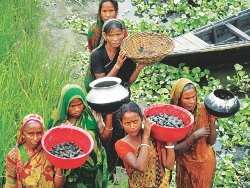40pc food poisonous
�
�

Desk Report : The bright colours and firmness of the fruits on display at a shop in Karwan Bazar in Dhaka make one assume they are succulent and good for keeping cool during the heatwave sweeping across the capital. However, one has to wonder if they are safe to eat or tainted with chemicals. Photo: Anisur Rahman
The bright colours and firmness of the fruits on display at a shop in Karwan Bazar in Dhaka make one assume they are succulent and good for keeping cool during the heatwave sweeping across the capital. However, one has to wonder if they are safe to eat or tainted with chemicals. Photo: Anisur Rahman
Banned pesticides that cause serious health hazards have been found in fruits, vegetables, milk and milk products and dry fish, according to a FAO-sponsored test at a government laboratory.
Pesticides such as DDT (Dichloro-diphenyl-trichloroethane), Aldrin, Chlordane and Heptachlor -- all highly toxic to humans -- are present in fruits, vegetables and dry fish, show test results of National Food Safety Laboratory (NFSL).
�
�
Forty percent of the 82 samples of milk and milk products, fruits, vegetables and dry fish contained pesticides that had been banned more than one and a half decades ago.
Carrot, bean, tomato, lettuce, capsicum, banana, apple, pineapple and mango were contaminated with highly toxic pesticides. And the presence of banned pesticide Aldrin was found in milk. Banned pesticides were also found in dry fish.
The presence of toxic substances in the food samples was three to 20 times higher the limits set by the European Union, according to the NFSL tests.
A number of agriculturists have blamed lax government monitoring at field level for the use of banned pesticides in food. These pesticides are probably being smuggled into the country, as import of the highly toxic substances has been banned for long, they say.
Some 50 percent of the vegetable samples and 35 percent of the fruit samples were contaminated with chemical pesticides, which the lab analysts said are unsafe for human.
These pesticides are toxic to both humans and animals, say food safety and public health experts.
Accumulation of the toxic substances in the body over a long period can lead to cancer, neurological and reproductive problems, said Sridhar Dharmapuri, food safety officer of Food and Agriculture Organization (FAO) in Bangladesh.
Heavy metal such as lead, chromium and arsenic also accumulate in the body and may cause kidney and liver failure and abnormality among children, he said.
"It is surprising that these pesticides are found in common food items, despite the fact that these chemicals were banned long ago because of high toxicity," said Syed Nurul Alam, chief scientific officer at Entomology division at Bangladesh Agricultural Research Institute (Bari).
A test at the Bari lab also found the presence of banned pesticides in dry fish last year, he said.
The plant protection wing of the Department of Agricultural Extension (DAE) is responsible for regulating and monitoring use of pesticides in farming. Its field offices have specialists and inspectors to look into matters related to pesticides and plant protection.
DAE Director General Md Abu Hanif Miah told The Daily Star that all field offices have instructions to take action against sales and use of banned and substandard pesticides.
In every upazila, there is a vigilance team to check sales of the prohibited toxic chemicals. It conducts drives with the help of local administration, he said.
"You will not find banned pesticides in stores," he said.
Asked how banned pesticides are being used in fruits and vegetables, he said those might have been smuggled into the country.
Ruman Hafiz, chairman of Bangladesh Crop Protection Association (BCPA), claimed, "None of our members deals in banned pesticides, as there is no scope for importing and selling these highly toxic chemicals."
These banned pesticides might be smuggled into Bangladesh from neighbouring countries, said the leader of BCPA, a platform of pesticide marketers in Bangladesh.
"It is the duty of law enforcement agencies to check trade of such prohibited chemicals," he added.
The NFSL also tested samples of rice, turmeric, poultry meat and juices, and found presence of heavy metal in those.
Arsenic and chromium were present above safe limits in three of 13 samples, and formalin was found in coriander, mango and shrimp, it said.
The presence of lead chromate in turmeric was much higher than the permissible limit set by the Bangladesh Standards and Testing Institution.
The NFSL also detected presence of antibiotics in chicken and fish samples. "High microbial populations were found in several samples of pasteurised milk indicating poor processing procedures by the manufacturers," it said.
Dr Subimal Sinha Choudhury, director at the Institute of Public Health (IPH), said the use of pesticide, fertiliser and fish or livestock feeds should come up as a major issue since chemicals or metals start getting into the food chain from production level.
"Regulations should be framed accordingly," he said. the daily star
�
Local Time : 0306 Hours, 27 April 2024
|
|









